They told me they would call a ‘bhoot’ if I didn’t stop screaming
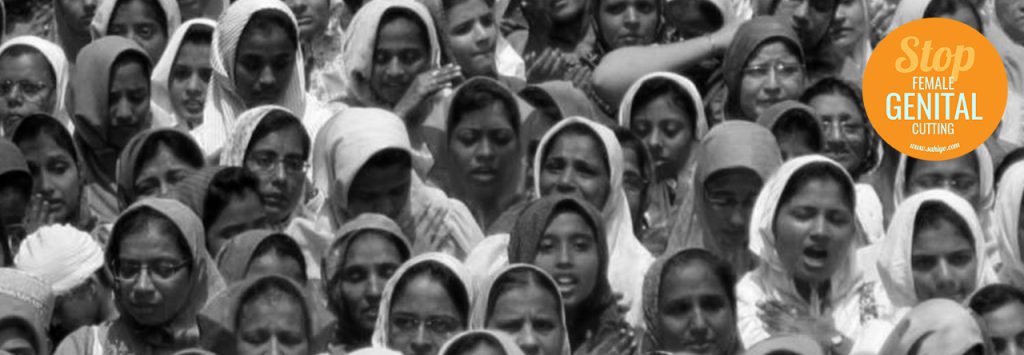
(First published on February 26, 2016) by Fatema Kabira Age: 19 Country: India Seven years old. I was seven years old when they forced me to have a part of my femininity cut off. I don’t remember much from my childhood. My memories are very vague. Yet, despite my poor memory, I clearly remember the day I was circumcised. That day is a vivid memory. My grandmother and mom told me I was going for a sitabi (a celebration for women and girls). I used to love sitabis when I was a kid. So, I got really excited and eagerly awaited going to the sitabi. I even insisted to my mom that I wear my new clothes and topi. After dressing up in my favourite clothes, I left with my grandmother and mom to go to the sitabi. We didn’t end up attending any sitabi and instead we went to a place that was unfamiliar to me. It was an old looking building. The steps were covered with dust and were broken. I was confused why we were there. We went inside somebody’s house and were greeted by a middle-aged woman whom I failed to recognize. I asked my mom what was going on, but she ignored me. The house was small with only one room, kitchen, and a storage unit attached to the ceiling. The one room was dim and gloomy and gave out an eerie feeling. The Aunty chatted with us for a while and then went inside another room to bring something back. When she came out she had a blade and 2 or 3 other items in her hands (I can’t recall what they were). She came and sat in front of me. My mind went blank. I thought, ‘Blade? For what?’ My grandmother then asked me to remove my pants. Innocently, I told them I did not want to use their washroom. My 7-year-old brain could not comprehend any other reason why my grandmother would ask me to remove my pants. And that too in front of an unknown woman, since my grandmother knows how shy I was even in front of my own mother. But I obliged my grandmother’s request. They made me lie down and held my hands firmly to the ground. The next thing I remember is the sight of the silver blade and a sharp agonizing pain in my most intimate area. I screamed in terror. What did they do? The Aunty told me to keep quiet or she will call the “bhoot” (ghost) that stayed in her storage unit. I didn’t oblige this time. I screamed and yelled and tried to free myself. It was all in vain. They did what they wanted to do. It was all over. I cried all the way home. It hurt every time I urinated. The sight of the blood made me sick. I was hurt and angry and confronted my mother about this. She told me she was under religious obligation and she did what thought was the right thing to do at that time. Fortunately, I didn’t face any medical repercussions due to the unhygienic and brutal way in which I was circumcised. But it has left a psychological impact on me. I feel disgusted, ashamed, and angry at what has been done to me. There is no reason that justifies this barbaric practice. There is no reason that justifies taking away women’s inherent physical rights and ability to experience pleasure. Young girls are scarred for life and this needs to be stopped.
I will not support khatna even if my in-laws pressurise me
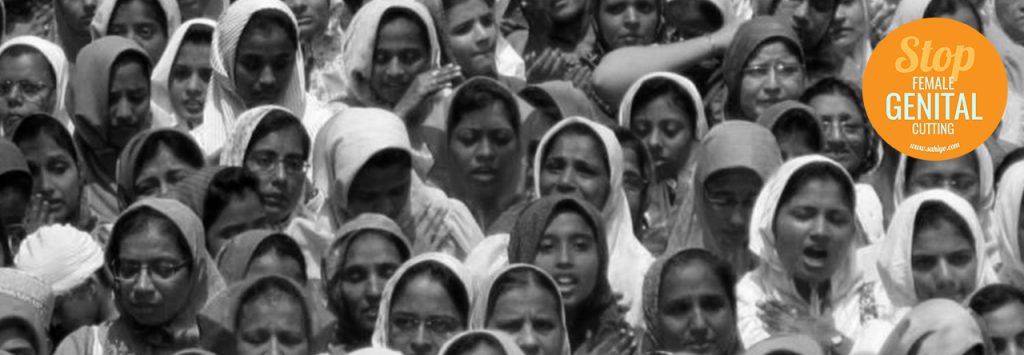
by Ummehani Age: 28 Country: India I was all of five and do not remember much. What I do remember is my mum and my sister taking me to some Aunty’s house on the pretext of meeting a relative. That unknown Aunty made me sleep on a soft table kind of a thing and asked me not to worry at all. She then pulled my panties down and had some knife sort of thing. I am not sure what it was. She prayed something and cut some part of my genitals…again, I’m not sure what. She put some medicine on a cotton ball, put it down there, and made me wear my panty. She asked my mum to feed me coconut water thrice a day for two days. As far as I remember, I didn’t ask my mum or my sister anything about what had happened to me. I was so shocked and taken aback. The next day, my panty was stained. My mum made me wear a new one and I guess it stopped bleeding thereafter. I don’t think I had difficulty peeing – of course, there must have been a little discomfort for sure but I have no vivid memories of it. People of our Bohra Muslim community say that khatna is a mandatory ritual and we have to carry it out for every little girl and boy. They say it’s a dirty part that needs to be cut. I don’t know how far this is true. I also don’t know whether girls from other communities enjoy better sex or not. There have been many reports about this that I am unsure of. There is actually a lot of vagueness on this topic that I would like to have some clarification on. I am married and my husband is pretty cool and modern. I would not want khatna for my daughter, but I don’t know if my in-laws and my parents would agree if I differed with them on this ritual. Even if they insist on having it done, I still don’t support the practice. I will not do it for my daughter.
I was spared from khatna because my Dadi happened to pass away

by Anonymous Age: 34 Country: India I came to know about the practice when I was seven years old, but all I knew was that khatna means removing something from your body. My two elder sisters have undergone khatna, but I was not cut. The reason for this is that my dadi (grandmother) passed away before it was my turn to be cut. My parents had got my sisters’ khatna done because of pressure from my dadi – otherwise, they never wanted to perform khatna on any of their daughters. I was in the 7th standard when I first discussed khatna with my mother. After coming from school, I told my mother about a class we had had on sex education, menstruation, puberty and bodily changes. My mom brought up khatna during this talk. She told me it is done to reduce sexual pleasure. Innocently, I asked her, “Mummy, maru pan khatna thavanu chhe?” (Will khatna happen to me also?) She said no, and I was very happy then. One of my sisters has a daughter, but she has decided she will not have khatna performed on her. I do not support this practice either. Such a tradition that harms women’s sexuality and rights should be stopped.
I was cut, my daughter too, but it stops with my granddaughter
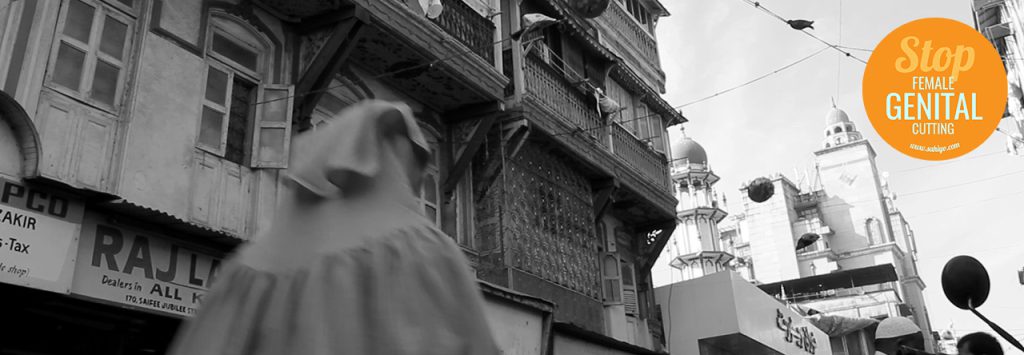
Age: 58 Country: India I was 7 years old when my grandmother told me that she is taking me out. I was so happy and dressed up quickly, expecting to be given some goodies. Instead, I was taken to the house of a strange lady who frightened me when she pinned me down. And after that, what I remember is howling, crying, acute pain, and everyone around pacifying me. The whole day passed with agony and I was afraid to pass urine because of the pain. I kept on asking my mother and grandmother about what was done to me. The only answers I got: it was for my good and I would be fine soon. However, as I grew up, I was enlightened about “Khatna” as an Islamic tradition, which was also performed on my younger brother. Later, when it was my daughter’s turn, I had to quietly go along with our religious tenets. Now, my granddaughter is 6 years old, and for her, I will not support the practice of khatna. Now I am convinced that female circumcision only results in agony and pain for a girl child, with none of the benefits it is claimed to have. Also, not all Muslim communities practice it. Moreover, I am happy that NGOs like Sahiyo have brought this issue to the forefront and are getting worldwide support.
Why this Bohra father is guilty about his daughter’s Khatna
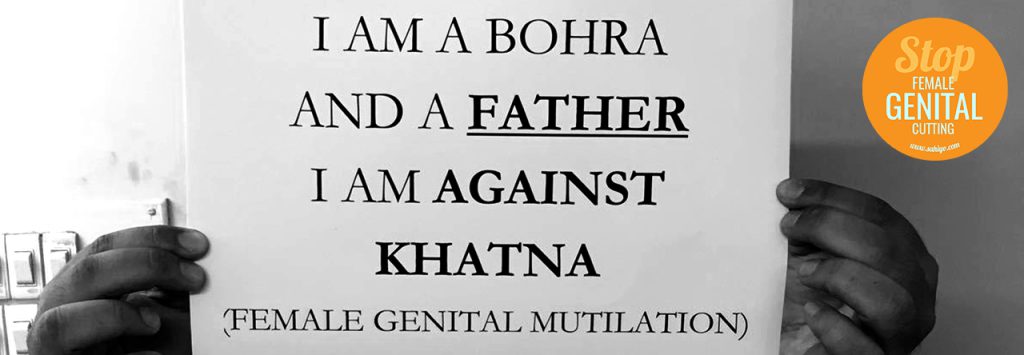
(First published on May 5, 2016) Name: Yusuf Country: India The fatwa given during the Zikra majlis by Syedna Mufaddal Saifuddin in favor of female genital cutting dug up the wound that exists in my heart which makes me write this post. Looking at parts from the audio clip leaked from the majlis, at one point, Syedna Mufaddal Saifuddin says what translates to English as: “It must be done. If it is a man, it can be done openly and if it is a woman it must be discreet. But the act must be done. Do you understand what I am saying? Let people say what they want.” The Syedna made no direct mention of the word “khatna” or “khafz”, but asks that the act be done discreetly for girls so that the community does not get tangled in any legal trouble. He cryptically says, “Do you understand what I am saying?” It was a clear reference to female genital mutilation (FGM). It is obvious that this was in response to the raging debate on FGM that has occurred in public after three Bohras were convicted in Australia for practicing khatna on two minor girls. No one from the clergy has come forward to participate in this debate, and the Syedna in his fatwa said, “We are not willing to talk to anyone on this issue”. The reason this issue dug up a wound in my heart is that a couple of years ago my daughter was made to undergo this barbaric ritual, against my wishes, under pressure from family elders and the ladies in particular. A year before my daughter turned seven, my wife told me that when our daughter turns seven we have to do her khatna. Unlike most men in the community, I was aware of what khatna or FGM is and I told her that I will not allow this. I told her this practice was started centuries ago by Bohras who wanted to curb the sexual desire of their women, as they frequently traveled for business. I told her that there is no scientific/medical basis for khatna or FGM. There is no mention of it in the Quran and that other Muslim sects do not practice it. I even told her that it is illegal in the western world and has been declared a violation of human rights by the United Nations. What I also did was initiate a discussion within my close Bohra friend group. I raised the issue as to why a girl who doesn’t understand what is going on or what’s being done to her has to go through this, especially when the ones taking her for the cut are people she trusts. One reply I received from a female friend in the group is etched in my memory. She said, “Would you want your daughter to have multiple sex partners and have extramarital affairs?” I was taken aback by the reply, particularly as this friend is a well-educated person otherwise! It left me in despair on realizing the extent of falsehoods that have been propagated within the community, with people being brainwashed into believing something as barbaric as khatna, which has no scientific basis and is a violation of human rights. Forcibly doing something that is thought to curb sexual desire is in itself a violation of human rights. If educated young women of the community think in this manner, what to say of the elders who still dominate decision-making in the majority of Bohra households? My wife agreed with me and was reluctant to put our daughter through the horror. She told my mom and her mom that I was against the decision. She was told by both that there would be no argument and that this centuries-old practice has to continue just like how they went through it. Being the only son, I live with my parents. My wife was torn between me on one side and my mother and her mother on the other. Talking to my parents did not help and ended with the usual invocation that it’s a “religious obligation”, Moula, tears, emotions, etc. My wife and I left the matter there hoping that when the time came, we could fake it. But, when my daughter turned seven, my mom said she would accompany us to take our daughter to get her khatna. She wouldn’t let us go alone. She made sure the appointment with a Bohra gynecologist (sigh!) was made. My daughter was put under the blade. The fault is mine. Maybe I wasn’t strong enough or forceful enough then to prevent that atrocity on my daughter. But, now that there is a perfidious attitude where on one hand there is this fatwa in favor of the practice, while on the other hand, jamaats in Western countries have issued letters telling citizens to refrain from the practice, I thought it is time we men from the community spoke out against it. It is time for Bohra men to be informed about this evil practice and come out against it to save their daughters. As it is well-known that the consequences of openly raising your voice against the Syedna has dire consequences, it is going to be difficult to get rid of this practice by mobilizing support from within the community. Some people may be against it, but they don’t say it openly. In my opinion, building support in the larger civil society and legal recourse is the best way to end the practice. Maybe a public interest litigation (PIL) in India will get positive result. There is already a raging debate in India over triple talaq after a lady filed a PIL against it, and it has got larger public attention and support. I commend the members of Sahiyo who are fighting against FGM. This post is my small contribution in support of their effort for a common good. ~ Written by Yusuf, a guilt-ridden and remorseful father belonging to the Dawoodi Bohra community.
Of tattoos, female circumcision and hypocrisy
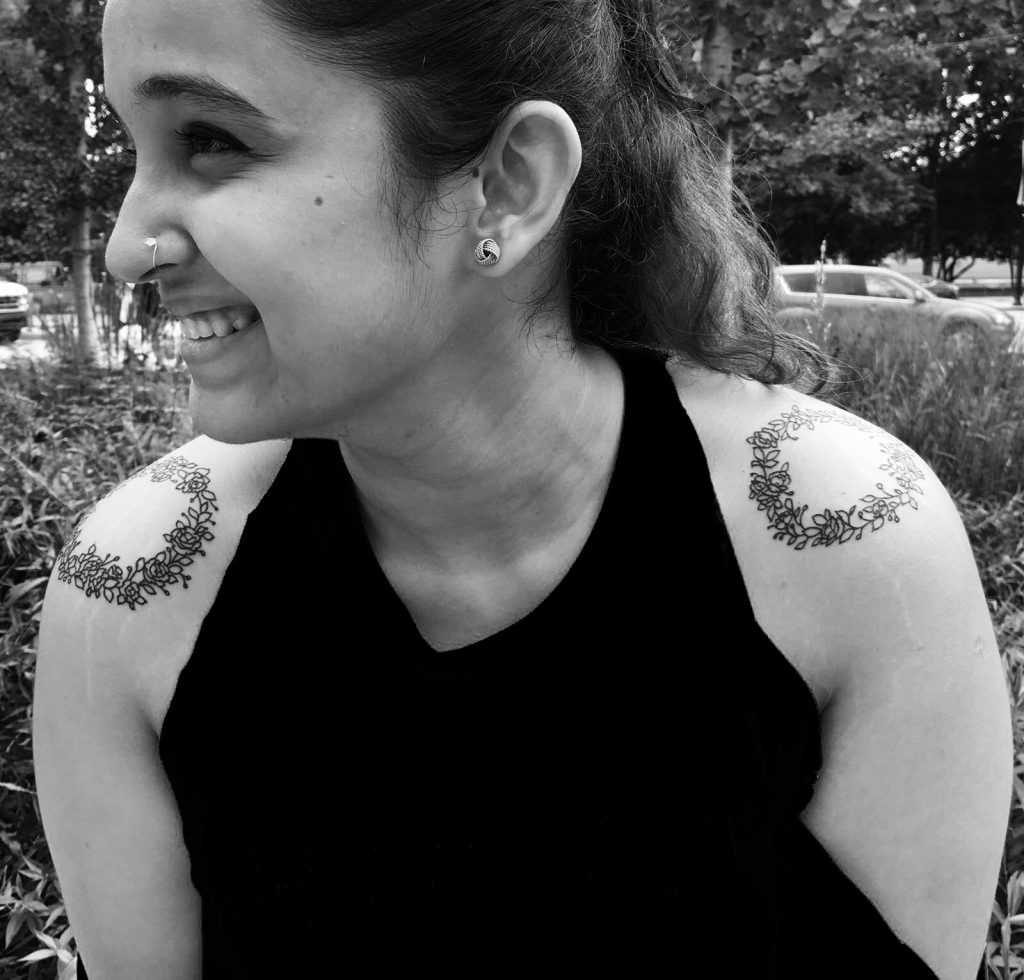
by Azra Adenwala Age: 21 Country: United States / India (Read the Hindi translation of this article here.) I never truly thought about my khatna (circumcision) until a while ago when I came across the organization Sahiyo. To be honest, I had no idea what it meant in the first place. It was when I started reading articles by other women who had experienced khatna that I realized that I, too, was a victim of this gruesome practice. I had simply buried this memory deep for I could not fathom what it meant or where it stemmed from. I was probably 5 or 6 years old. I was with my family on vacation – somewhere in Gujarat, as far as I can recall. I do not remember anything else from this trip, except certain painful bits and pieces. I remember being taken into a dingy bathroom, with a man or a woman in all white. I remember seeing scissors, and I remember seeing blood. I remember crying, as a bandage was applied to my genitals. I do not remember anyone telling me why or what had just happened to me. Everything seemed to go on as usual, as if nothing out of the blue occurred and I simply accepted this as it was for, I had no idea what had been done to my body. I have not really been scarred due to my khatna and it has not altered my life in any way. However, what makes me cringe is the fact that this was my body, and no one had or has the right to make any changes to it, especially such unhealthy ones just because “it is how it is”. I remember, three years back, when I got my first tattoo. When one of my extended family members saw this tattoo on my body, they told me, “You are a Muslim, and our religion dictates that your body must be returned to its grave exactly how it came out from the mother’s womb”. In other words, we must not make any alterations to our body and accept it as it has been given to us by god. If this is the case, then why were my genitals mutilated? What sort of hypocrisy is this? A religion cannot create rules based on what suits it. At some point, we need to realize the fact that it is us who have created religion in the first place. And we need to stop following rituals just because “tradition demands it”. We live in a modern society and we got to where we are right now because we embraced change. Female genital circumcision cannot dictate a woman’s faith in Islam. I find it extremely shallow, and I do not think anyone should be subjected to this practice, especially little children who have no idea what is happening to them. I might not have been adversely affected, but there are a number of women out there who have. Every woman must have the right to her own body for there is no point in having faith in a god that apparently condones such a horrible and inhuman practice.
When Sahyog gave Sahiyo an opportunity to engage with young students
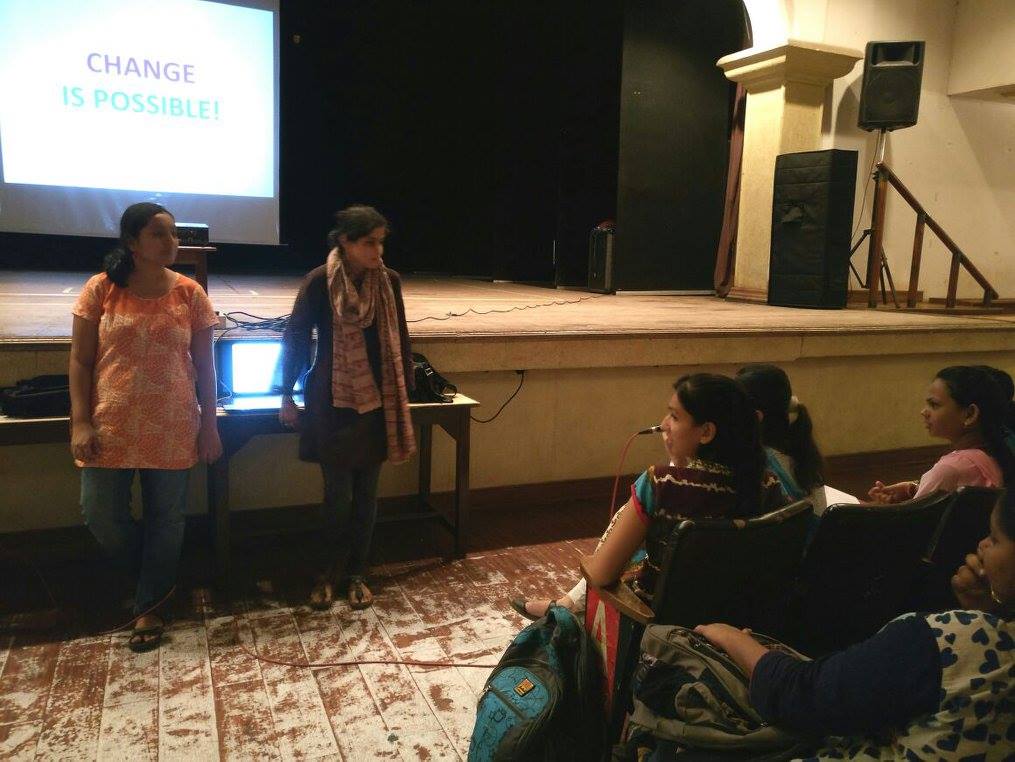
“You have no right over your body.” Things khatna supporters have told me
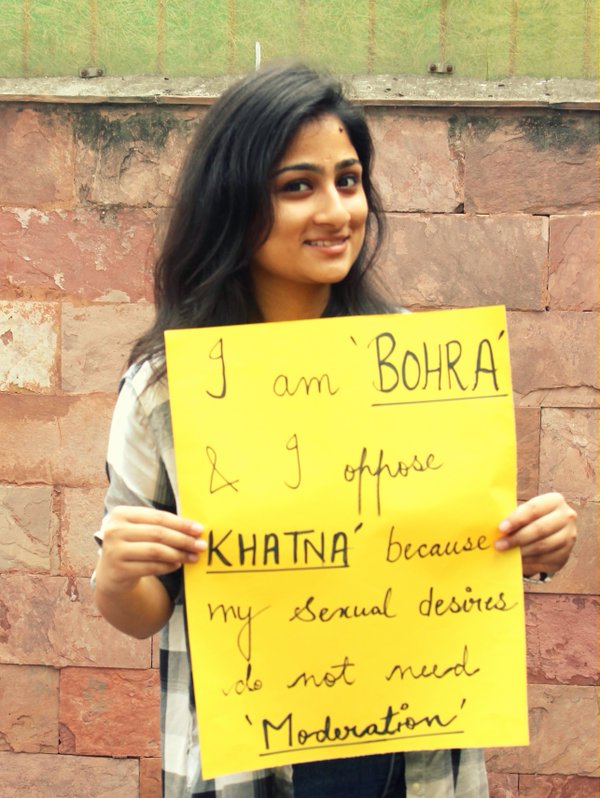
By: Saleha Paatwala Age: 23 Country: India After watching ‘Reflecting Her’ (a film on FGC) that gave me strength to fight, it has now been six months since I set out on this mission to end the hazardous practice of Khatna. In these months, I have had discussions with numerous individuals including my relatives, some of whom have been against the practice and some of whom have been in support of it. From my discussions, I have learned why some individuals support this practice and continue following it. At first, I was extremely apprehensive to begin discussing this topic in my family group, but I knew that I had to. After my conversation with them, I realized my own relatives were living with misguided knowledge on the topic. Below are a few reasons given by individuals who support the practice. I have also included my answers to their reasons: Cousin – It is Rasullah’s sunnah (the Prophet’s preaching for the benefit of people, not a compulsion) which has been taken after.My response – If Khatna is Sunnah, why has it been made obligatory on all ladies, then? Friend – It is Allah who has made us and as a dedication to him, we should give him something.My response – If he has made us, why does he need us to give something back to him? Also, if he truly needs some kind of devotion from us, why not cut a hand or a leg and give him, may b Grandmother – Women get to be devout and clean.My response – Why would Allah send us to earth impious and impure? So are those who haven’t experienced this practice corrupt and debase? Cousin – If not done on time, she may become promiscuous and destroy her life.My response – How does a piece of her body lead her to promiscuity? Doesn’t that depend on her upbringing and not her clitoris? Cousin – You have no right over your body.My response – Yes, according to ‘you’, women have no privilege to explore her sexuality. People can touch her without her consent & cut any part of her because she has no right on her own body. Cousin– If she has undergone this practice, she will be faithful to her husband.My response – Are women born just to keep her better half fulfilled, to make due in this patriarchal society? One comment which was made by a relative still echoes in my ears. “I will soon give birth to a girl, make her undergo khatna before you, and you won’t be able to stop me from doing it”. In the twenty-first century, where ideas are developing rapidly, holding on to such patriarchal thinking is pointless. I was stunned to hear one of my friend’s thoughts on this issue. He said, “It’s good to make Allah happy by giving him something”. Many people consider it a religious practice. They think it is written in the holy book, the ‘Quran’. But when I ask them to show me where it is written, they provide me no answer. Many of those who I asked, told me not to go further into this issue as it will lead to my alienation. According to them, I am squandering my time trying to end this practice. Yet I know that it is imperative to understand the outcomes of this practice when it is considered to be a part of your religion and when it is done on young girls who have no clue why it is being performed on them. It maddens me to imagine that we were sliced just to control our sexuality. Why not permit ladies to live as they are and explore their sexuality without putting confinements on them. A little seven-year-old girl, who doesn’t yet understand what sexuality is, is taken through this insidious practice which later gives her the feeling of betrayal by her own family members. This cruelty is so important that if she hasn’t got cut in her younger age, she gets asked by her in-laws at the time of marriage to undergo it so that she becomes pious, before the marriage. Many women still can’t speak out against this practice even if they want to do so because patriarchal traditions still consider women as servants of her in-laws and her husband. From the Twitter debate in July, organized by Sahiyo, numerous arguments came forward that supported Khatna. One such lady said, “I had experienced it and I don’t considerably recall the agony. It was managed without harming me and I have no unforgiving memory of it”. She continued, “I also gave consent to my parents to have my ears pierced & it didn’t harm too”. I have heard many arguments comparing khatna to ear or nose piercing. While ear piercing doesn’t remove any skin, FGC in the Bohra community includes partial or complete removal of the clitoral hood. If I didn’t have the support of my folks, it would have been difficult to speak out against this practice. My mom, who couldn’t stop her mother from taking her and us to have this practice performed, now strictly condemns this act and wants me to fight FGC until it ends. Khatna was considered a secretive act and so I never spoke about it to anyone, not even with my sisters. After gathering more courage, I spoke about it to my father and he said “yes, I knew about this act. Your grandmother was so stubborn that she didn’t listen to me at all.” When my father tried to stop her, my grandmother told him, “Don’t you want your girl to be pious? Do you want her to become promiscuous?” He lost that argument which is what prompted my sisters to get circumcised as well. He also now wants me to speak out against the practice so that no other girl goes through such a practice which is neither religiously based nor has any health benefits.
A brief report on Sahiyo’s media workshop on khatna among Bohras
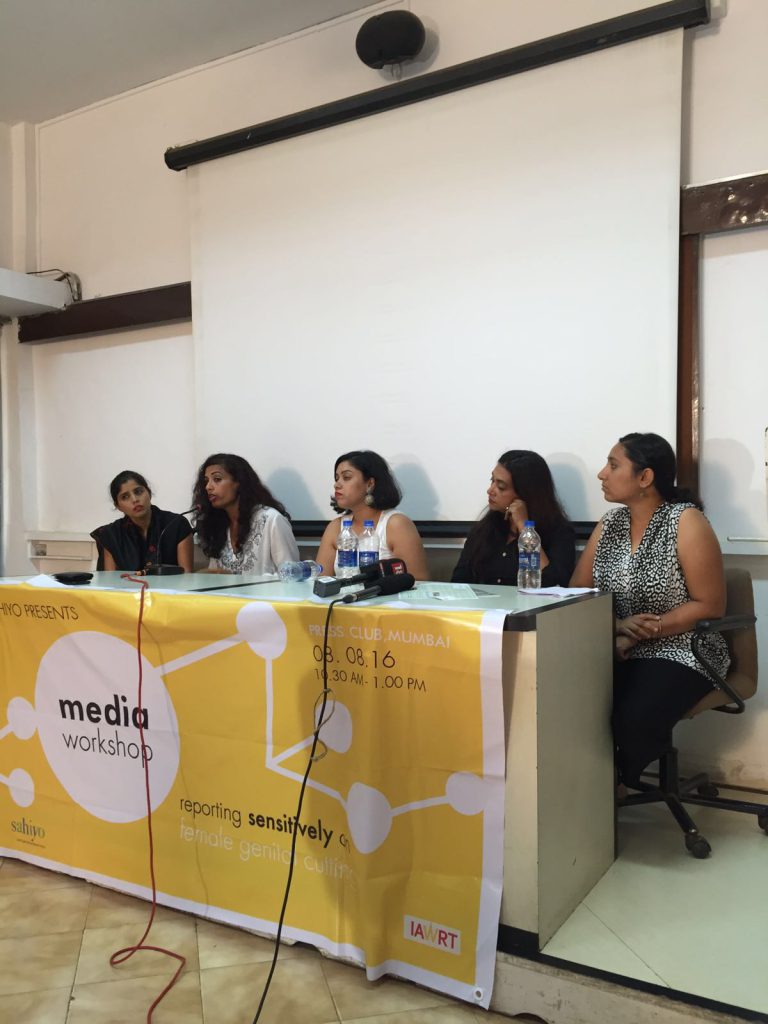
The Un-Cut
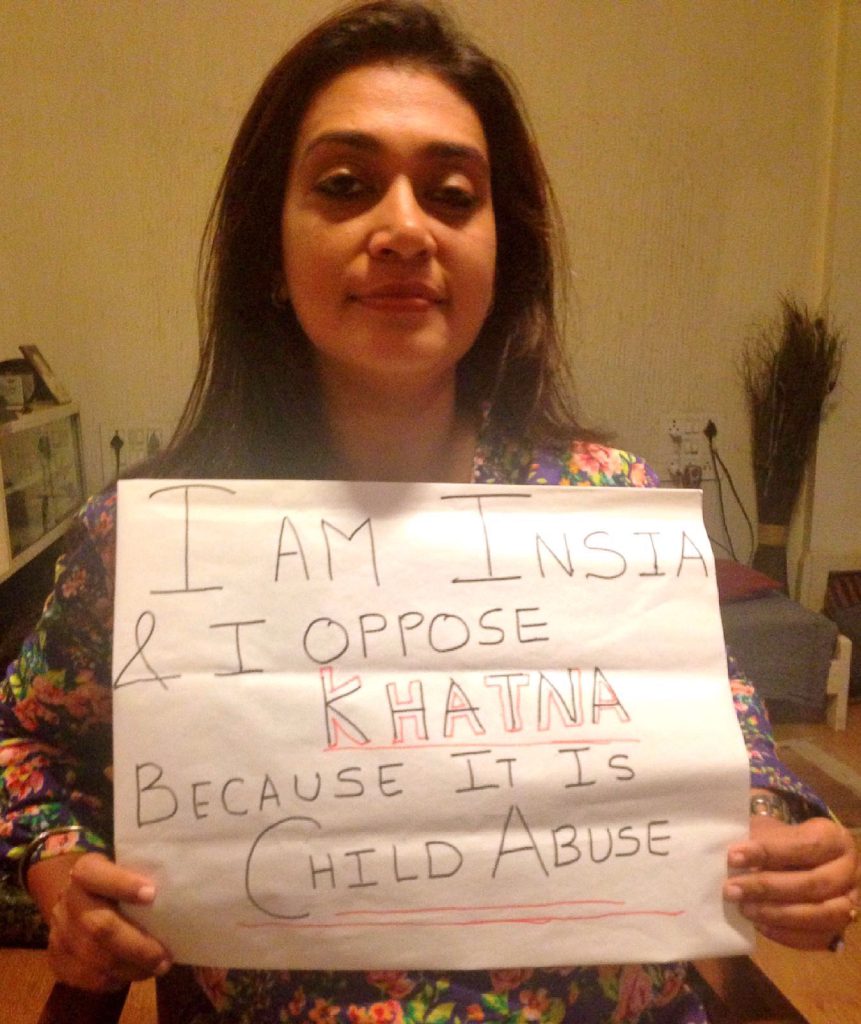
(Originally published on Café Dissensus website on May 5, 2016. Republished here with permission from author). (Trigger Warning: Below is the account of one woman’s experience of her sister undergoing FGC. We thank her for being brave and sharing her story with us). Country: India By Insia Dariwala I still recall that wet rainy day in our four-by-four cramped shoebox. To the world it was a pit – dark and dingy; but to us this was home – a royal home that ceremoniously ended where it began. In our spare time, my sister and I loved sitting at the windowsill that overlooked years of dirt and misery. Imagining the intertwined pipes that crawled off our chawl to be a game of snakes and ladders, I wondered if we would ever escape the venom of this dreaded place. The narrow and smelly cramped lanes had pain written all over them. Every stain on the walls lining the chawl was a reminder of a dream splattered perhaps by a .32 pistol. Luckily my father’s stains were far more conventional: two betel paan leaves with lots of limestone and kimaam (an intoxicating ingredient). Each night as we prepared for our descent into the world of dreams, we would be awakened by a loud bang at our door. In his usual drunken state, our neighbor had once again forgotten his house. His constant arrival at our doorstep was a grim reminder of how easy it was to get lost here. Most of the time we lulled ourselves to sleep under a wrinkled, patchy blanket and my sister and I felt more at ease there than anywhere else in the world. It was here that we plotted our future, and re-lived our Cinderella moments of getting rescued by handsome knights in shining armor. Fatema would joke, “But what if he doesn’t come?” To which I would widen my big eyes, make a sword from my long braid in one hand and say, “Fear not, my dear sister, I will protect you no matter what.” Fatema would then giggle loudly, only to be shushed by our mother-hen who was always on the lookout for boys peeping through our broken glass windows. Our mother-hen was a dutiful wife with an unflinching tolerance for dad’s consistent tyranny. Thanks to my father, our never-ending poverty was sponsored by his alcoholism. His frequent showers of physical and verbal abuse were far more generous than the money he put in her hands. Almost all of our mornings dawned with mom’s screams and dad’s abuses. That day too was no different, or maybe it was, because this time the shrieks were not just mom’s. Dad hit mom hard across the face. Hurriedly, we ducked behind the tattered curtains, getting our uniforms on and struggling to dodge the gaping holes in the curtains, lest someone should see through our innocence. Looking through those holes, I wondered if my future too would be this hollow. When the storm settled, we peered into hell. Maa’s eyes were red. Her lip had a bluish tinge and it was hard to tell if it was from the slap she must have got or from biting down her urge to retaliate. Pappa nonchalantly spat his venom out of the window and looked at us with disgust. We then sat down to eat our breakfast, hoping we would not lose our only meal of the day to the joint family system. The daily bread of salt from my tears was getting quite tasteless now. Just then Rukaiya aunty walked in, surprisingly, far more pleasant than usual. Mom watched her offer some candy to Fatema. Hopeful and hungry, I put out my hand for one. Instead, she just walked away, leaving me salivating at the candy in Fatema’s mouth. Poor Fatema felt horrible seeing me in tears, but not as horrible as she was going to feel later on. Mom asked us to run off to school but no sooner had we reached the door aunty called out to Fatema. “Look, Fatema.” Fatema’s angelic face lit up with excitement as she saw her dream flutter in aunty’s hand. Two tickets to the matinee show of the hit film, Sholay. Fatema always had a weakness for Hindi films and Hindi songs. Even at the tender age of seven, she could sing every song with more proficiency than our older cousins. Had there been an Indian Idol then, she would have surely won. On one occasion, Fatema had come storming into the house, waving a ten-rupee note that the uncles had given her. ‘Golden voice’, they used to call her. We listed hundreds of ways to spend those ten rupees. It’s incredible the things you can do with ten rupees, when that’s all you have. Chandu’s sandwich was first on the list; watching the much awaited Sholay, second. Children below eleven were free, so we could treat our mother to a film as well as the sandwich. After all, she did eat more salt than us. But while our taste buds danced to the thought of Chandu’s chutney, and Mom dreamt of styling her hair like Hema Malini, Dad had already reached into our hopes and vanished with the money. Some other golden voice must have got lucky that night. So on that day when Fatema’s dream of watching Sholay was finally coming true, I too joined in the excitement and begged Aunty to take me along. My pleas, though, fell on deaf ears. They don’t love me as much, I thought. The tantrums and pleas continued. Fatema looked towards Maa, who kept giving us the look, which meant business. But Dad’s voice overpowered her. “Let her go. Study is useless anyway.” Mom reluctantly gave in. Fatema shrieked with joy. I fumed with jealousy. That’s so unfair, I thought. I reached for my school bag and Fatema looked at me guiltily. Our poverty had always taught us to share everything. Unfortunately, what she came back with that day was something I could never share.
